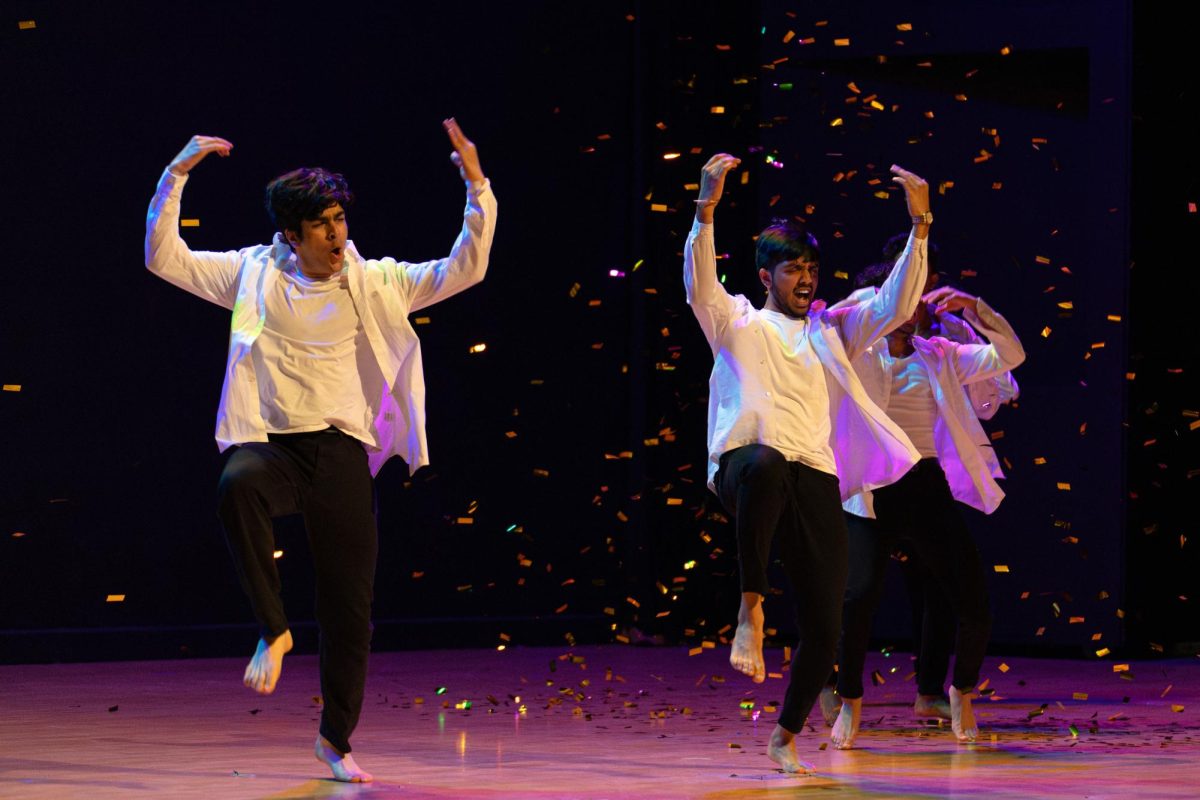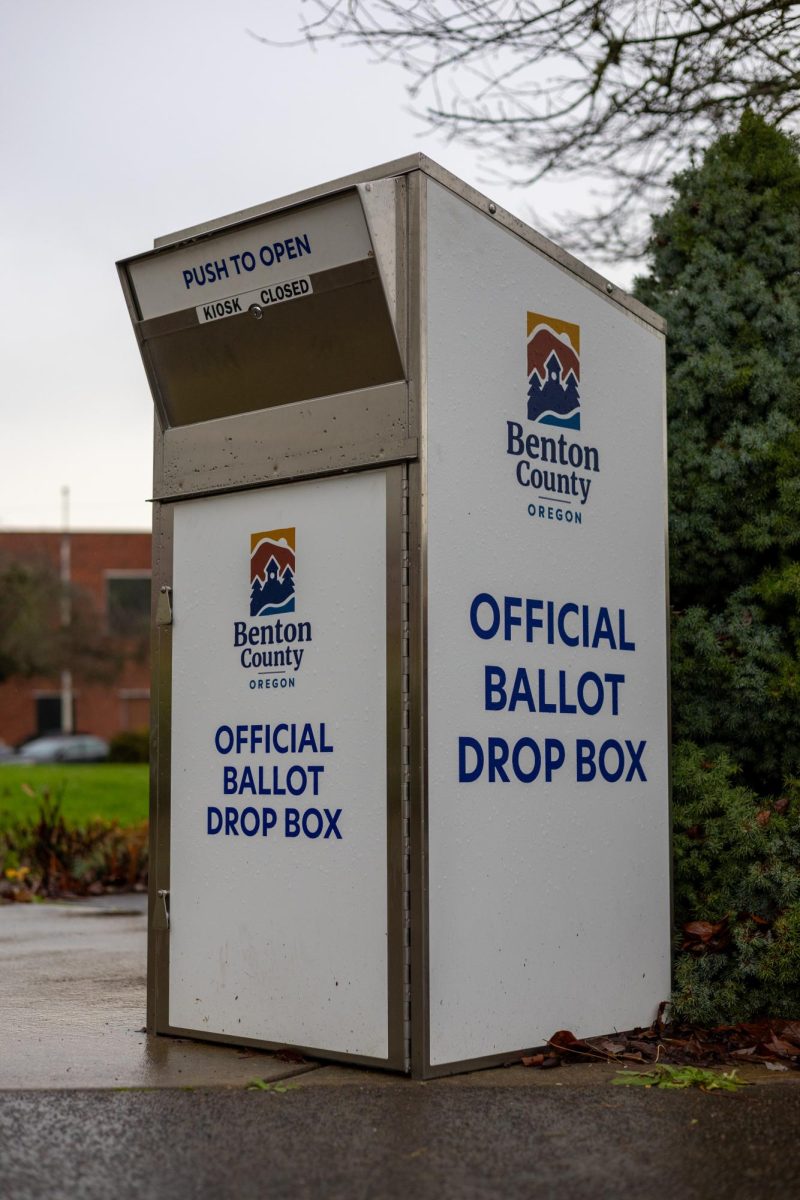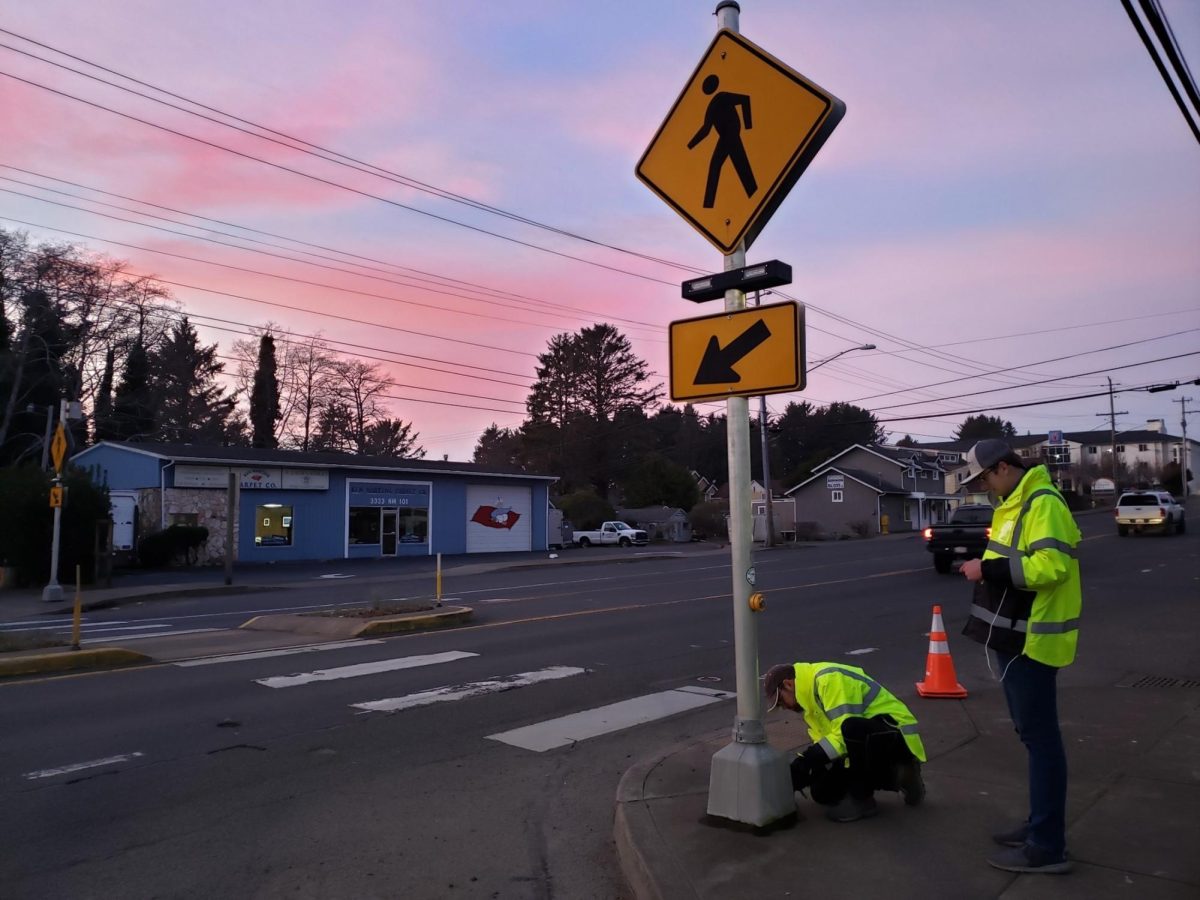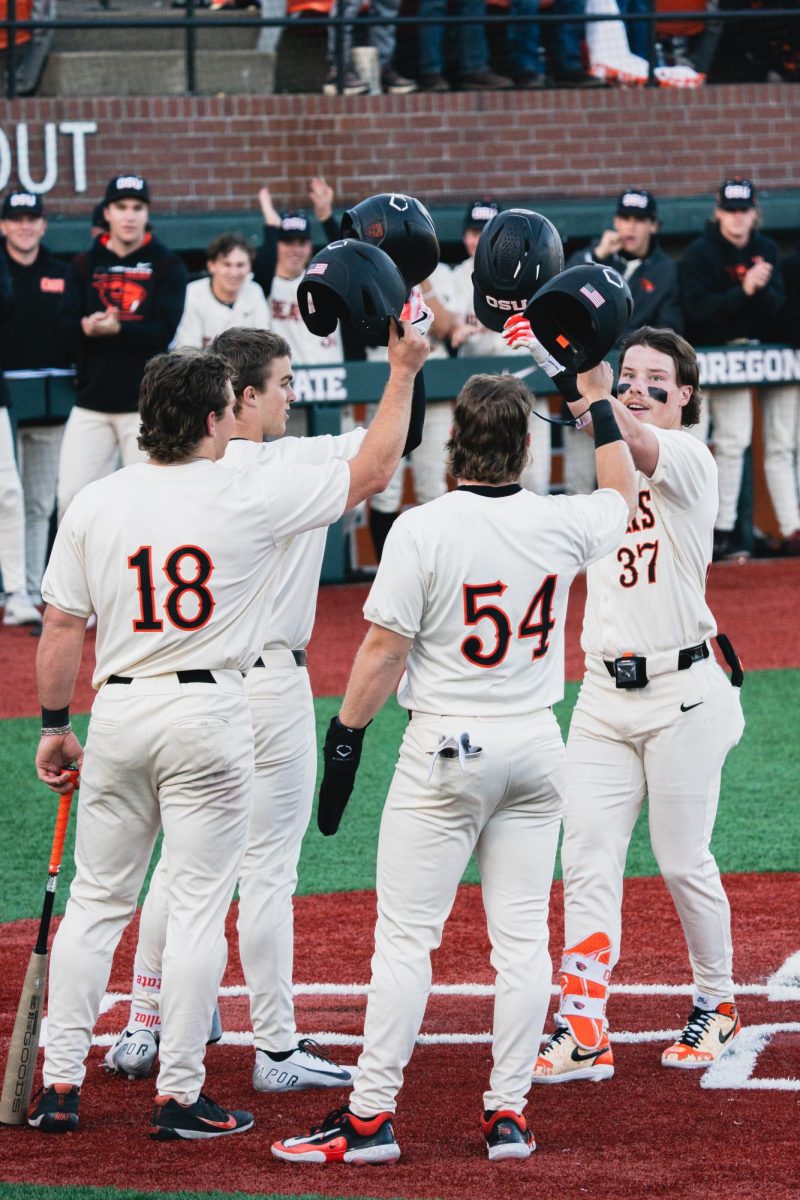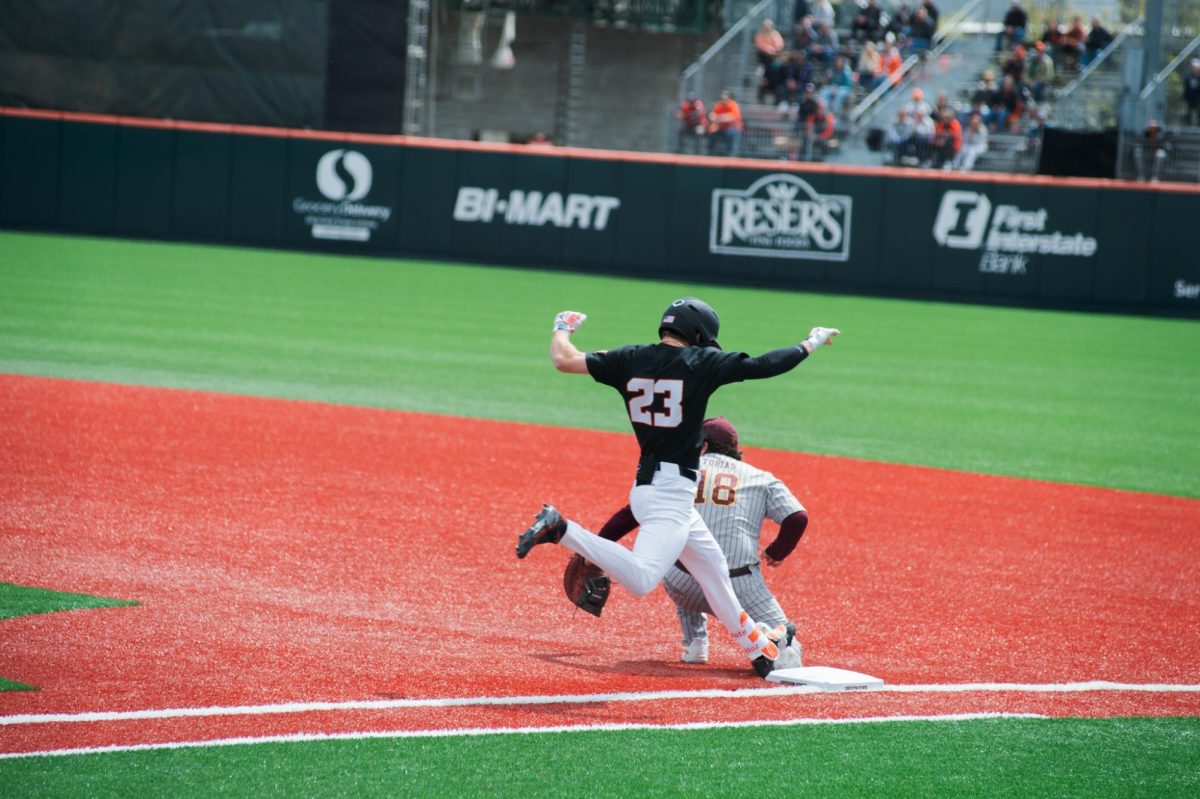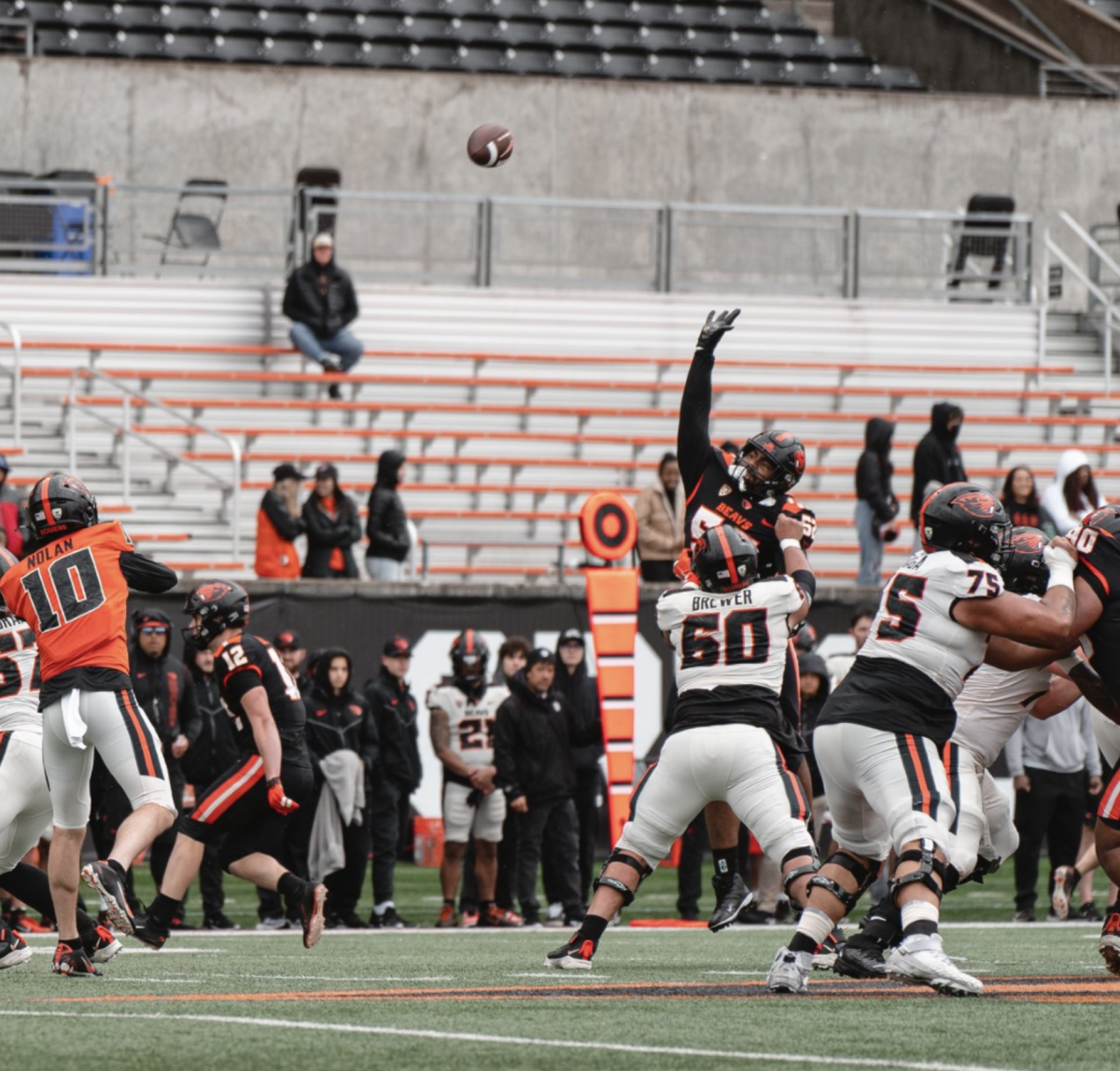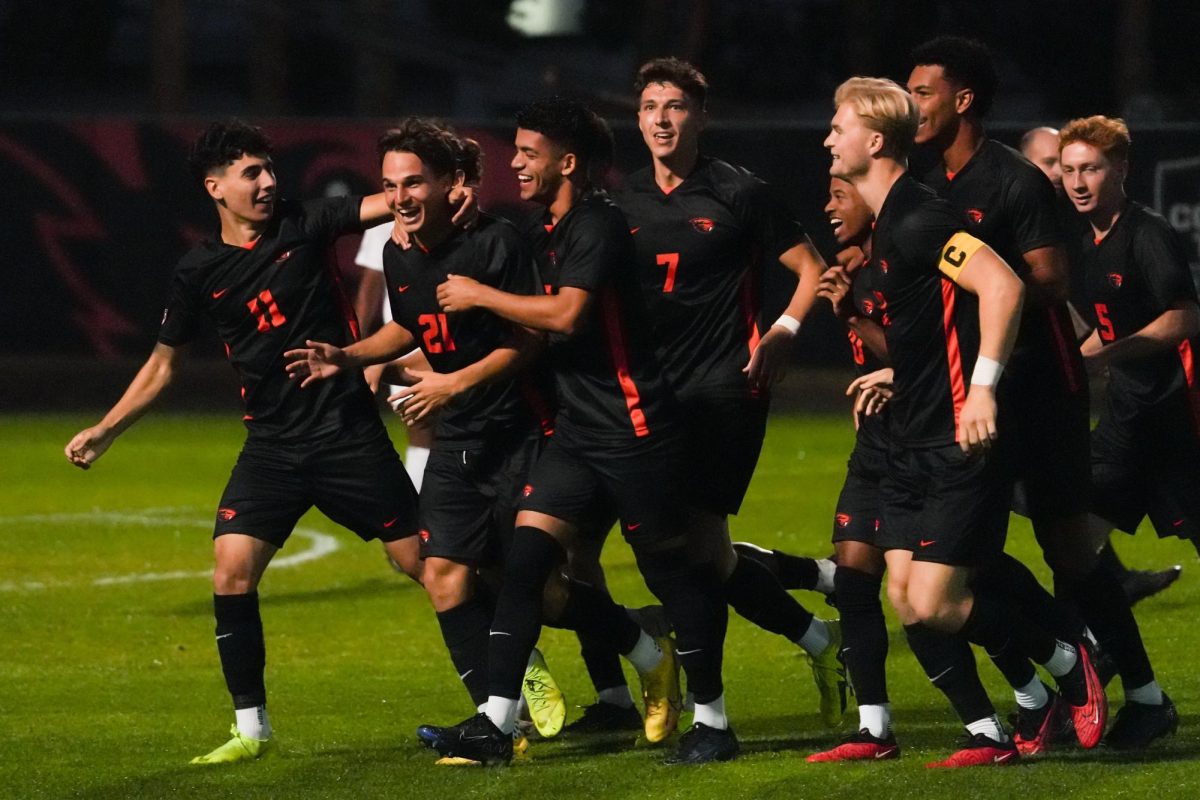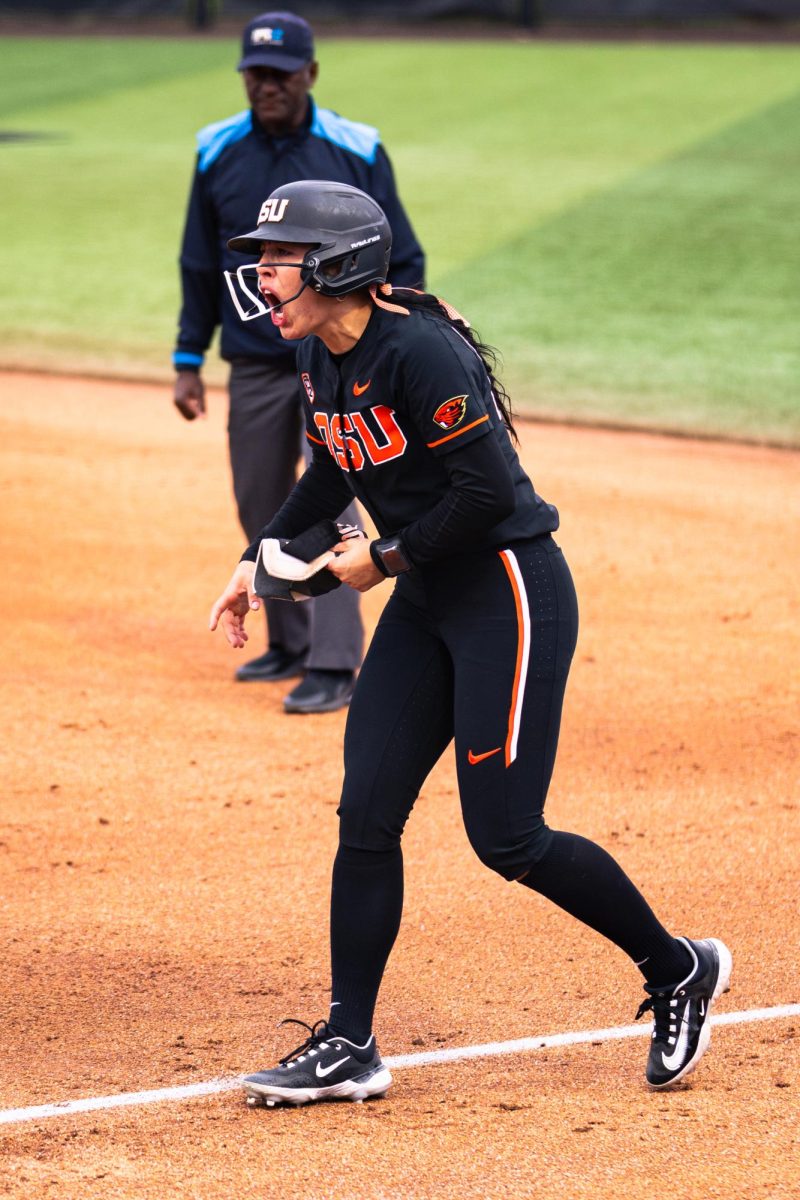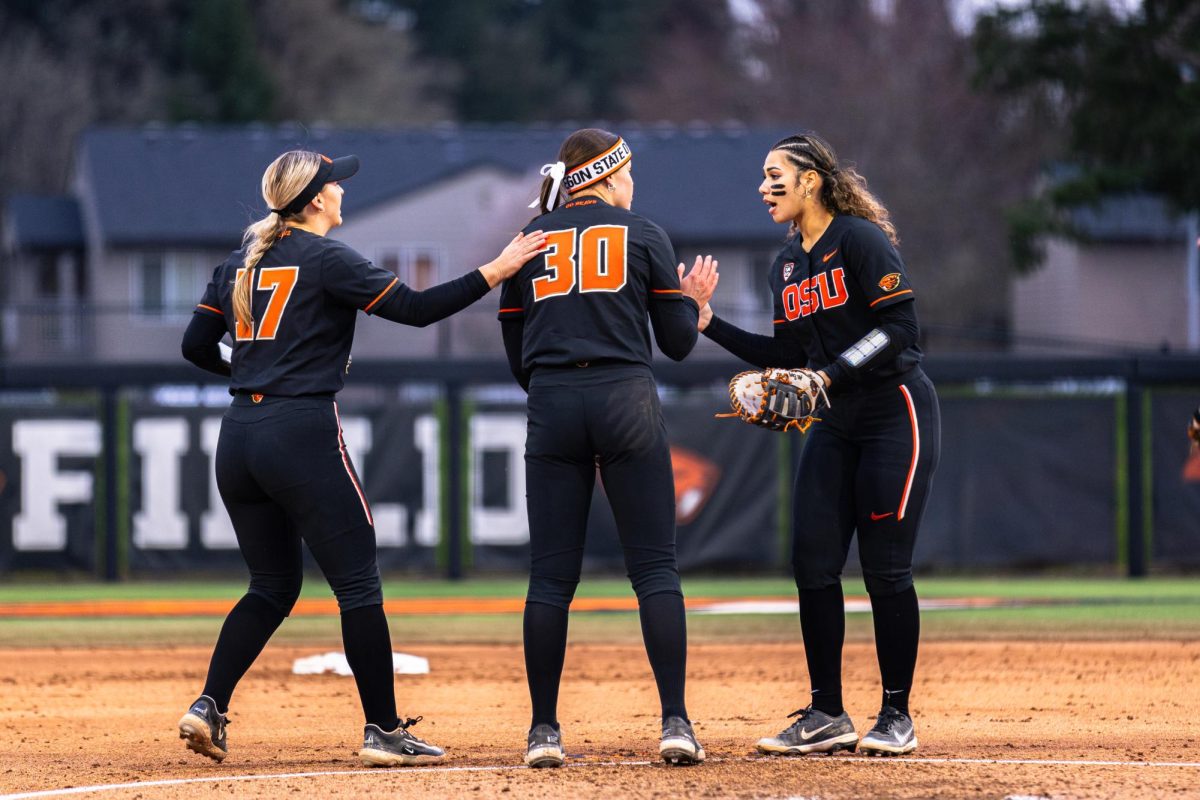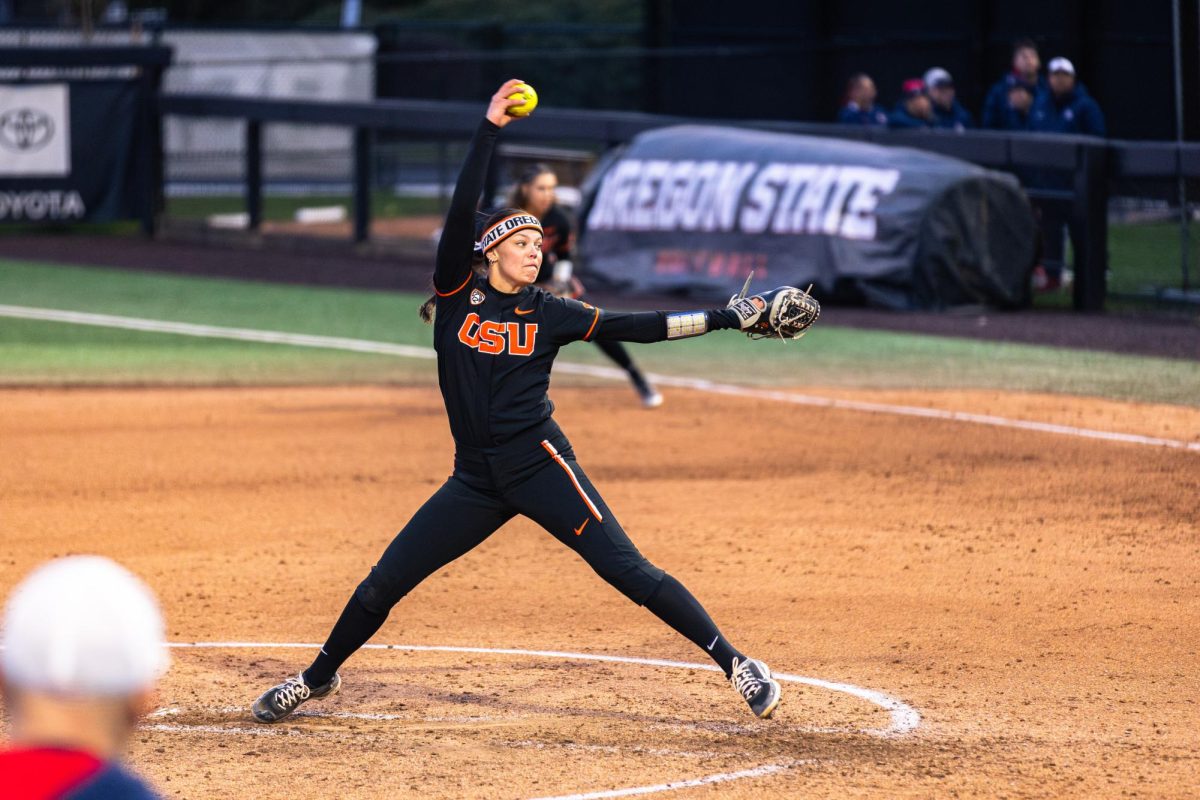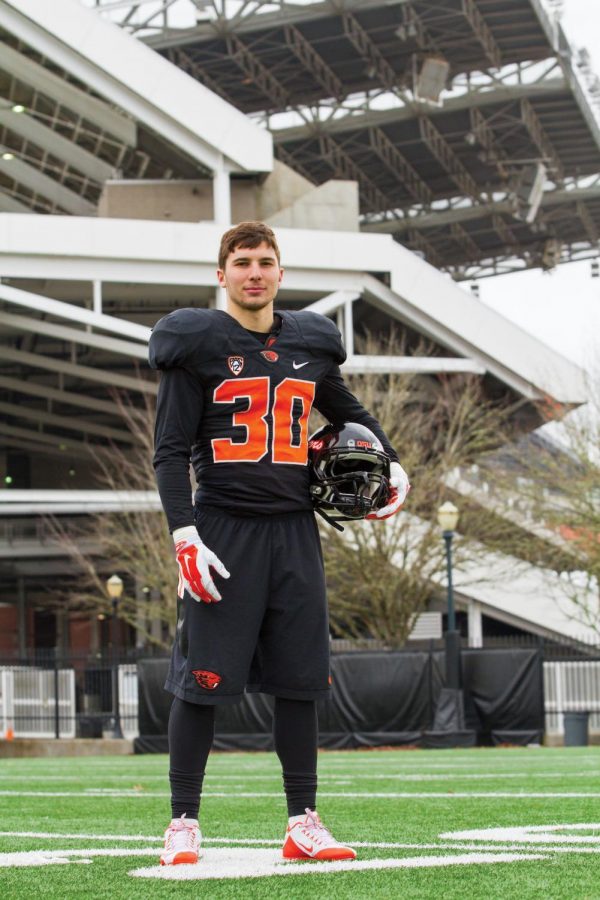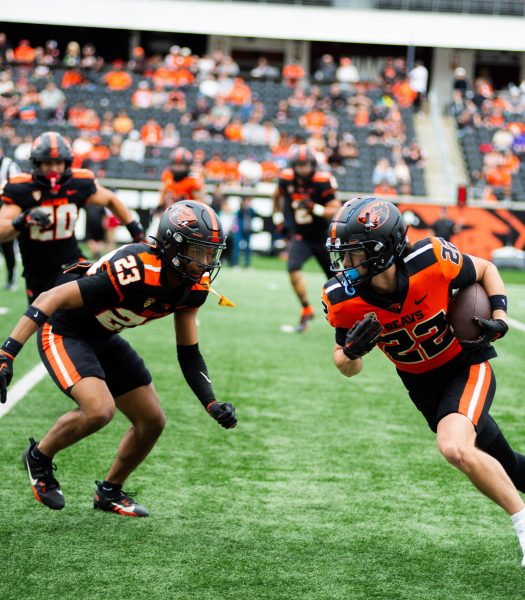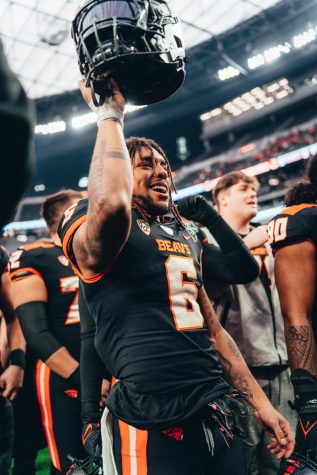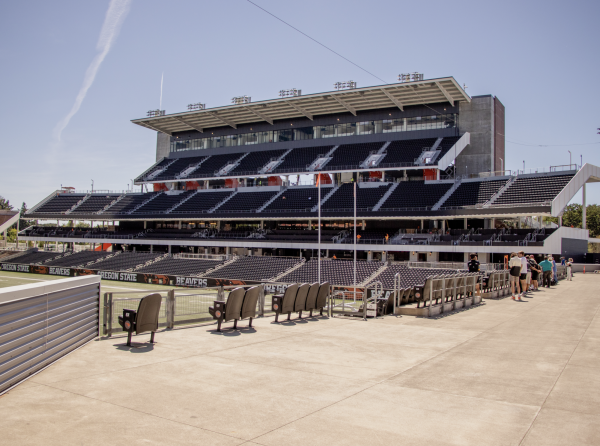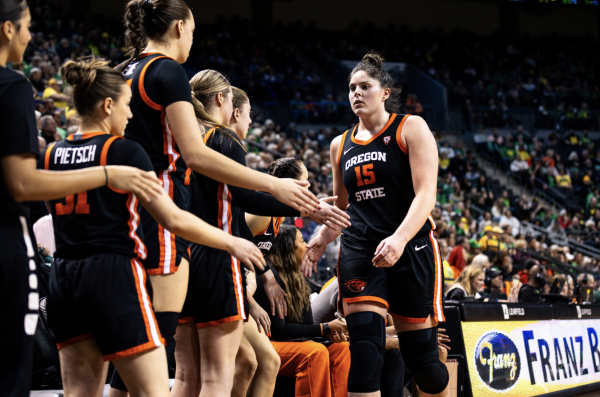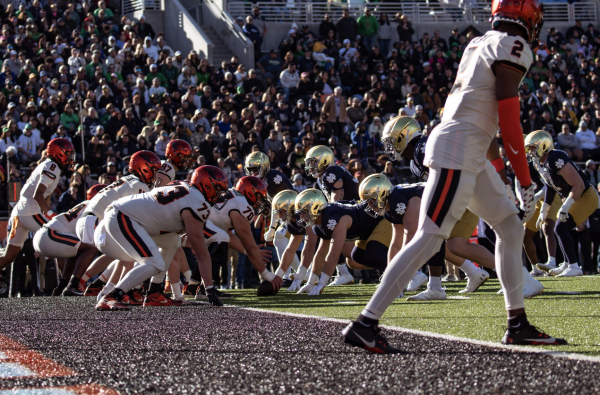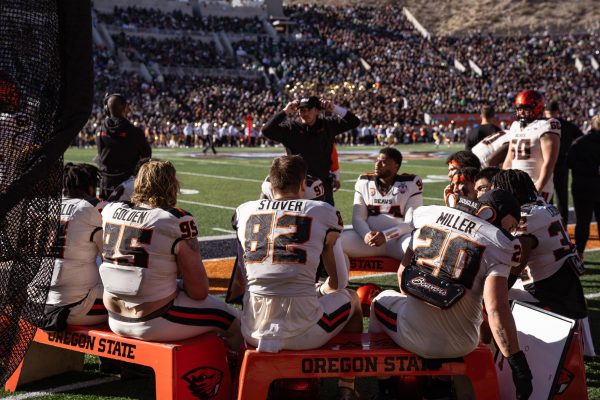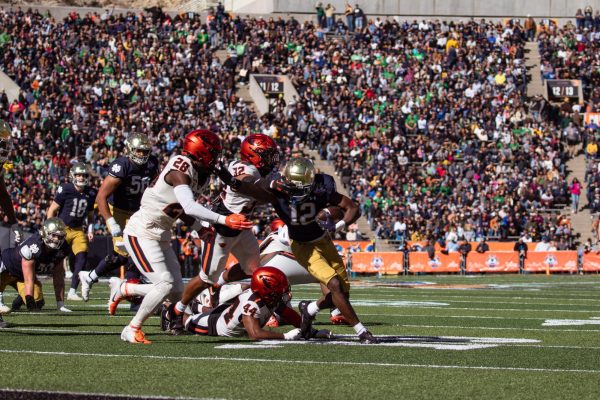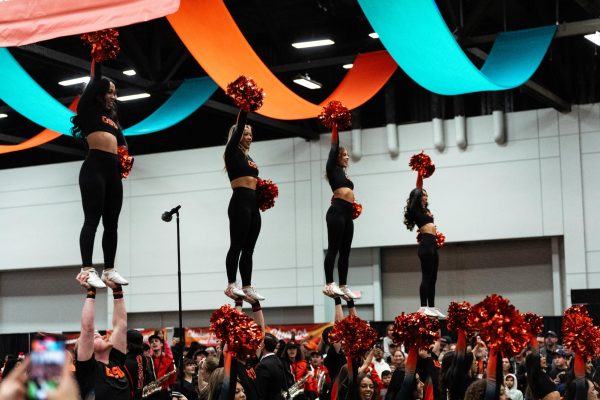Having to step away from the game, Oregon State’s Gabe Ovgard has found a new role with the team
November 26, 2016
Concussions have cut Gabe Ovgard’s playing career short, but he hasn’t stopped being involved in the program
A year ago, Gabe Ovgard was set to start in the biggest football game in the state of Oregon—the Civil War.
At this year’s Civil War, Gabe Ovgard is at his Klamath Falls home with the flu. On a typical game day, Ovgard will be spending his time with a child from the “Dream Come True” program who is facing a serious illness. It’s the same routine Ovgard’s had all season. He takes the kids on tours of the locker rooms, giving out jerseys and signed footballs, introduces them to the team and takes them onto the field at Reser Stadium as the team warms up for their upcoming game.
As much joy as he gets out his new game day ritual, it’s difficult to compare to what he was doing a season ago when he was taking the field.
“Game days are tough,” Ovgard said. “That’s been the hardest part for me by far.”
On the Beavers’ first defense series in what turned into a 52-42 loss to their rival at Autzen Stadium in 2015, Ovgard went to push Oregon wide out Darren Carrington II out of bounds at about the 10-yard line. But what was supposed to be a push, turned into a helmet-to-helmet collision between Carrington II and Ovgard.
After the Ducks scored on the next play, Ovgard trotted off the field and did not return for the remainder of the game.
It would also be end up being the last time Ovgard would play the game of football for Oregon State.
At the time, no one knew it. The small-town kid turned walk-on was one of the few bright spots in Oregon State’s 2-10, zero Pac-12 win season. It wasn’t until the latter half of that season when a slew of injuries to the secondary forced Ovgard into action. When he got his opportunity, he took full advantage.
Praised by head coach Gary Andersen for the effort he exuded during the final two games of the season when he finished with 17 tackles and an interception, Ovgard was surprised with a scholarship at the end of offseason conditioning.
Two days before the Beavers would open their fall camp in Bend, Ovgard fielded questions about his rise in the program. Questions about his interception of eventual No. 1 pick Jared Goff, to him having a bigger role in the upcoming season as the team’s primary backup at safety.
As he answered the questions, he looked like a player itching to get back on the field.
But what appeared to be excitement and giddiness on the exterior was actually actually a mask covering up his anxiety and panic. Ovgard had a history of concussions. It had become such an issue that if he got his bell rung one more time he would be forced sit out the entire season, and the possibility of him ever returning to the game was in jeopardy.
“Coming in to fall camp, something had changed in me just kind of a sense of worry and fear,” Ovgard said. “I hate to say it, but it was there.”
Those close with Ovgard notice the alteration in his demeanor as fall camp approached.
”I could kind of see it in him, even just by talking to him you could tell he was worried about it,” said fellow safety Drew Kell, who has roomed with Ovgard since the two came to Oregon State together in 2013. “It was on his mind the whole time, you could definitely see some hesitation.
“Anything that showed little symptoms he was really overcautious.”
On the team’s second day of full contact, Ovgard made a routine play on a running back, got back up and continued practicing. It wasn’t until he woke up the next morning, the day the team was set to return to Corvallis, that the familiar concussion symptoms resurfaced.
“I had woken up with symptoms and the symptoms are exactly how they feel the day after a concussion,” Ovgard said. “By this time I knew that feeling pretty well.”
Sensitivity to light, headaches, fogginess and an overall feeling that not everything is clear were the symptoms Ovgard would feel when he was concussed.
Knowing the consequences of another concussion, Ovgard went to the training staff to go through the protocol for concussions, which included a battery test. The test revealed a concussion. So when the team returned to Corvallis to continue fall camp, Ovgard returned to his home in Klamath Falls to make a decision that no athlete wants to make.
The decision on whether or not to walk away from the game he loves before he wants to.
“My assumption was that he was just taking time to figure things out,” Kell said. “That’s what you are hoping for.”
“I didn’t know much about them”
When Ovgard was in Jr. High he was riding a scooter with his friends, when his scooter shot out from under him and hit his head on the curb. That was when he suffered his first concussion. It wasn’t until he was playing high school football at the Triad School and Klamath Union that concussions became a reoccurring issue.
The landscape of football has changed even in the four years since his high school playing days. Back then, Ovgard was able to continue to play despite suffering six concussions by claiming he was having migraines. With the escalating emphasis put on brain injuries in football, using migraines as an excuse wouldn’t fly in today’s game.
“At the time I wasn’t really worried because I didn’t know much about them,” Ovgard said. “I thought it was something that just happens.”
The concussions didn’t stop Ovgard, who would eventually walk on at Oregon State as a wide receiver following his high school career, from playing football. The concussion problem that he had faced throughout his high school career had stopped. He went his entire redshirt season without a concussion.
That all changed in the second week of the ensuing spring camp.
“I went up for a ball, tipped it once and on my way down caught it and slammed my head against the ground — that was probably my worst one,” Ovgard said. “I was pretty much out of it for a couple of weeks there.”
When Oregon State went through a coaching change from Mike Riley to Gary Andersen, Ovgard made the switch from receiver to safety. The move brought on more inadvertent head-to-head collisions similar to what he suffered in his final game against Oregon.
“I fell down, tried to get back up, I blacked out then got back up,” Ovgard said of the hit that forced him to miss the majority of his second straight spring practice. “I recovered really well from that one, and at that point it was up in the air whether they would let me return, but I recovered well so they did.”
Even though getting concussions were starting to happen more frequently, Ovgard still believed that all would be fine and that he could continue to play.
“I’m pretty optimistic,” Ovgard said. “Maybe sometimes to a point where I’m not realistic, but going into the season I was like ‘I’m not going to have another concussion.’”
“More than a football player”
While the team began their second week of fall camp in Corvallis, Ovgard was at his Klamath Falls home contemplating with his family, mentors and pastor on whether it was time to walk away from the game that he had been playing since the first grade when he started playing flag football.
The decision was by no means an easy one.
“That stretch of days was the hardest stretch of days of my life so far,” Ovgard said. “Which I guess I’m grateful for because there could be a lot worse things.”
Each conversation that Ovgard had ended in similar fashion, despite how much he loved the game, the consequences of getting more concussions was not worth sacrificing his brain in the future. When all was said and done, Ovgard decided to step away from the game.
“I can’t tell you how many times that weekend I heard people tell me you are more than a football player,” Ovgard said. “Which is comforting, but also at the same time it’s hard to believe because that’s all I’ve ever been, so that was the topic of everything, ‘you are more than a football player.’”
Even Kell, his teammate, friend and roommate, recited the same message. As difficult as a message it may have been to give.
“It was rough for me to tell him that,” Kell said. “Football brought us together, we have that friendship and even more than a friendship, we shared some tears over it, and it’s hard to take in, because you’ll never understand why.”
Once his decision was made, Ovgard had to break the news.
He first talked to the team doctor, who was in full support of his decision, then he went to talk with Andersen, a conversation that he was dreading.
“That was one of the most anxious things I’ve been through,” Ovgard said. “Going into it, I was honestly terrified, I go in and he was extremely comforting, he wasn’t mad, but you could tell he was more frustrated but more at my situation than with me.”
Andersen shared with Ovgard that his own playing career was cut short due to injuries.
The news hit the team pretty hard. It was a difficult time for someone like Kell to see of the most revered players on the team have his career cut short.
“It hit me quite hard, I couldn’t voice it to him face-to-face just because of how emotional it was,” Kell said. “We came here together, and that was the story, that we were going to finish this together.”
Ovgard went to Twitter to let everyone else who cared to know, that he was retiring. Tweeting out a four-image screenshot of note explaining why he needed to retire. In the note, he thanked his teammates and coaches – both high school and college — his Klamath Falls community, and God for giving him the opportunity to play the game. It was a message that took several hours, and several rounds of editing with his family, for him to finally hit send.
It didn’t take long before his twitter feed blew up with messages of support from from teammates and Beaver fans.
“It was awesome,” Ovgard said. “I was holding back tears reading through all of those.”
“Things could be a lot worse for me”
Game days are especially tough for Ovgard, the hardest part of the transition from being a player to being a retired player.
“When it comes to game day,” Kell said, “you can see a little hesitation just because how hard it is to face that.”
Now Ovgard has a new role. He’s no longer chasing down running backs or dropping back into coverage to cover wide receivers. Instead he is interning for Beyond Football, a program that aims to assist student athletes in personal and professional development.
But it wasn’t as easy transition, he still missed the game — but mostly being around his teammates.
“You have a special bond with teammates,” Ovgard said. “Some of them you don’t really hang out with outside of football, so not having those guys around has been tough.”
“I give him so much respect passion for the game and for this team,” said Kayla Gross, director of Beyond Football. “He did struggle, as I think anyone would … and he was honest about that.”
Gross approached Ovgard with the opportunity to intern with Beyond Football, giving him the flexibility to be as involved as he wanted to be as he eased into no longer playing.
But much like the way he played the game, Ovgard didn’t go at this at half-speed. He went head-on with Beyond Football, where his compassion and easy-going attitude proved to be a natural fit with the work he would be doing.
“He’s just a humble, considerate, incredible genuine human being,” Gross said. “It’s really a testament to the person that he is: a caring, considerate person, and that is apparent in everything he does.”
Not only has Beyond Football given him a chance to remain connected with the team while building his resume, the experience has given him a new perspective in his life.
“It’s kind of opened my eyes that things could be worse for me,” Ovgard said. “Relatively, I have it pretty great, those kids are pretty strong and inspiring.”
On Twitter @brathbone3


